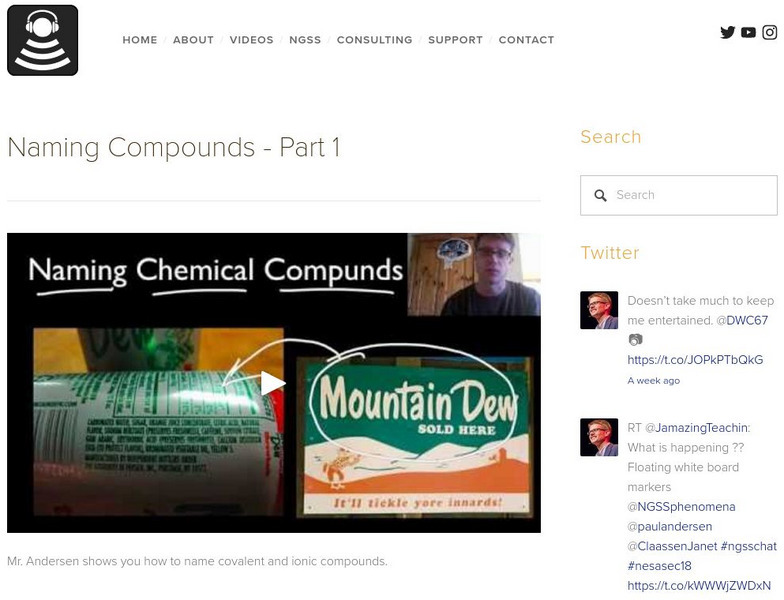Curated Video
Naming Covalent Compounds the EASY way | How to pass Chemistry
This videos will cover how to name covalent compounds. It is important to remember that we have to use prefixes when we name covalent compounds. Covalent bonds, or compounds, form between 2 nonmetals, or 2 anions. In a covalent bond the...
Schooling Online
Chemistry Properties and Structure of Matter: Properties of Matter - Naming Covalent Compounds
This lesson will discuss the rules for writing the names and chemical formulae of covalent molecules and covalent networks. Definitions included: compound, ionic compound, covalent compound, covalent bond, electronegativity, molecular...
Curated Video
Writing Formulas for Covalent Compounds
A covalent compound is formed when 2 nonmetals bond together. When we have a covalent compound we have to use a specific set of naming rules. The first rules is that the first element keeps its name. The second rule is that the second...
Professor Dave Explains
Practice Problem: Naming Ionic Compounds
We know about ionic bonds and ionic compounds, how do we name them? Let's practice going from formula to name, and also from name to formula.
Bozeman Science
Naming Compounds - Part 1
Mr. Andersen shows you how to name covalent and ionic compounds.
Professor Dave Explains
Coordination Compounds: Geometry and Nomenclature
We have been learning a lot about a wide variety of compounds, but we haven't really looked much at the transition metals. These also form compounds called coordination compounds, and the types of bonds involved in these compounds is...
Bozeman Science
Naming Compounds - Part 2
Mr. Andersen shows you how write the chemical formula for chemical names.
KnowMo
The Limits of Correlation: Understanding Causation and Making Predictions
The video is a lecture on the limits of correlation in statistics. The speaker discusses the importance of being careful when interpreting correlations and emphasizes that correlation does not infer causation. The video covers topics...
Curated Video
B1 English Listening Practice - American Culture Pt 2
This video serves as English listening comprehension practice for intermediate-level students. In this second part of the two-part video series on American culture, a native English speaker talks in a natural way about several different...
TED Talks
TED: A blueprint for reparations in the US | William "Sandy" Darity
With clarity and insight, economist and author William "Sandy" Darity discusses how the grievous injustice of slavery in the US led to the immense wealth gap that currently exists between Black and white Americans. He explains how...
FuseSchool
What Are Intermolecular Forces
Learn what intermolecular forces are, the three most common types and the differences between them. An intermolecular force is simply an attractive force between neighbouring molecules. There are three common types of intermolecular...
Curated Video
What Are Intermolecular Forces | Properties of Matter | Chemistry | FuseSchool
What Are Intermolecular Forces | Properties of Matter | Chemistry | FuseSchool Learn what intermolecular forces are, the three most common types and the differences between them. An intermolecular force is simply an attractive force...
Teacher's Pet
Acid-Base Theories
Learn about Arrhenius and Broasted-Lowry acid-base theory, the amphoteric nature of water and some properties of acids and bases in this video! transcript _______________________________________ every day you encounter acids and bases....
Bozeman Science
Naming Compounds - Part 1
A movie critic would describe this resource as a bit formulaic, but that's what makes it work! The video explains the formula, or rules, for naming both covalent and ionic compounds.
Bozeman Science
Naming Compounds - Part 2
CH2O is not the formula for seawater, and this resource explains why. The video models how to write the chemical formula when given the chemical name in both covalent an ionic forms.
Crash Course
Redox Reactions
The breakdown of your breakfast and plants photosynthesizing all relate to the simple movement of electrons. Learn about the complex manner of redox reactions, where electrons move from one compound to another, changing and propelling...
Sophia Learning
Sophia: Covalent Compounds: Formulas From Binary Compound Names: Lesson 1
This lesson will demonstrate how to write molecular formulas for binary covalent compounds when given the systemic name. It is 1 of 2 in the series titled "Covalent Compounds: Formulas from Binary Compound Names."
Sophia Learning
Sophia: Covalent Compounds: Naming Binary Compounds From Formulas: Lesson 2
This lesson will provide naming rules for binary covalent compounds and give examples. It is 2 of 2 in the series titled "Covalent Compounds: Naming Binary Compounds from Formulas."
Sophia Learning
Sophia: Ionic Compounds: Naming Compounds With Polyatomic Ions: Lesson 2
This lesson will provide naming rules for ionic compounds containing polyatomic ions and give examples. It is 2 of 2 in the series titled "Ionic Compounds: Naming Compounds with Polyatomic Ions in Formula."
Bozeman Science
Bozeman Science: Naming Compounds Part 1
Mr. Andersen shows you how to name covalent and ionic compounds.









